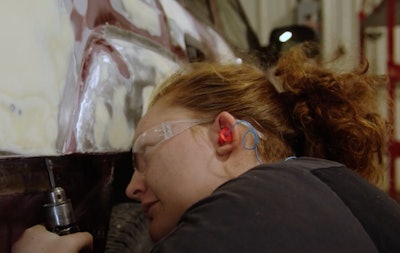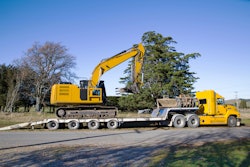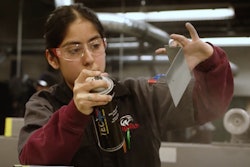
The following is the second of a two-part series that focuses on attracting women to careers as diesel technicians. The first part addressed the diesel technician shortage and how colleges are reaching into a previously mostly untapped talent pool: women.
Shannon Tinker attended diesel tech classes at Orange Southwest School District in Vermont in high school where she was told by her male cohorts that she “belonged in the kitchen.” Tinker, who gained her passion for mechanics as a child working with her father on “anything with an engine," ignored the naysayers and proceeded to enroll and graduate from Ohio Technical College, where she was the only woman in her class.
But she has been out of college now for over four months with no luck finding a job in the field.
“(Some companies) told me I was a liability because I’m a girl. There are places here that told me they won't hire me because they've had girls in the past, so they just won't consider me at all, so I currently don't have a job because nobody will hire me,” she said. “I had a job for a month, and all I got to do was sit there because the guys wouldn’t let me touch the truck because I might get hurt. Yeah, I might get hurt, but I learn that way.”
Today's workforce has seen a shift in what is perceived as proper gender roles, and more women are entering male-dominated fields like truck driving. But the diesel technician space is lagging behind.
[Related: ATA's Women in Motion initiative to focus on recruiting drivers, advocating for safer parking]
Darcy Stone, owner of G Stone Commercial in Middlebury, Vermont, and the only female dealer for Doosan Heavy Equipment in the U.S., said she thinks the industry as a whole is becoming more accepting of women in male-dominated roles, but women remain few and far between when it comes to diesel mechanics. Stone, who also grew up with a father in the industry, said she would love to hire a woman diesel technician, but she has never had one come knocking.
“There is no reason on God's green earth that a woman can't be a diesel tech in a man's world, because she can. She just has to have the guts to go for it," Stone said. “You have to be a go-getter; you have to go over and above what the men do, and you can't ever back off from that or else you will get eaten alive.
“I don't put ads out there saying I want to hire a woman because, honestly, the technician field is so thin that you just want a qualified technician period at this point. Nobody's entering the field anymore; it's a dying breed. So the ones that stick with it or enter it, they're going to do very well for themselves.”
Taylor Johnson, the only woman diesel technician at Werner Enterprises’ Phoenix terminal, is one of those.
Four months into her job, Johnson admits she regularly faces challenges that are typically seen as man’s work like lifting heavy tires, but she is fortunate to have coworkers to help so she can focus on the areas where she excels.
“I understand it’s a male-dominated industry, but I’ve gotten comfortable working with males in the shop. I understand that the men can be men; they tend to try to say, ‘Oh, you're not meant for this,’ maybe not in a direct way, but they kind of throw it at you,” Johnson said. “You just have to have a tough skin and continue forward and just do your job.”
But she said it’s an awesome job to have, and she especially likes the pay and benefits.
According to The State of Diesel Technicians report, produced by Randall Reilly and sponsored by Shell Lubricant Solutions, the top three factors in job selection are pay and benefits, location and opportunities for advancement.
The report shows the highest percentage of employees (17%) in this role earn between $50,000 and $60,000 annually, followed by 16% who earn $100,000 or more (all in the construction industry) and 15% who earn $60,000 to $70,000.
On the benefits side, the report says, 69% have the option for an IRA or 401(k) retirement plan. In terms of insurance, 83% have access to health, and 72% and 64% have access to dental and vision, respectively. Only 58% are offered life/accident/death and dismemberment insurance, and 57% have paid sick leave options, while 78% have paid holiday leave.
The report does not specifically consider childcare or parental leave, but Johnson said, as a mother, it is important for companies to consider offering these types of benefits if they want to attract women to the field.
And attracting women to the diesel tech space isn’t easy as recruitment efforts often pass them by.
WyoTech in Laramie, Wyoming, sends recruiters into high schools to present to shop classes to generate interest, but it doesn’t actively recruit women as its reach is based on the women who have already chosen to join these high school classes.
WyoTech President Jim Mathis said the technical college, which recruits nationally, is trying to diversify and expose WyoTech across more demographics with social media marketing campaigns, but he said most women won’t see the ads unless it’s something they’re already interested in because of algorithms.
The trades have seen a modest but steady increase in diversity among men and women in the past few years. According to a 2018 study by the Center for American Progress, 7.3% of apprenticeship program graduates were women. According to data from the U.S. Department of Labor, the number is up roughly 4% in two years, with women making up 11.6% of those who completed apprenticeship programs in the 2020 fiscal year.
The State of Diesel Technicians report says that 67% of diesel techs found their jobs by word of mouth, and 52% find employment via job posting sites like Indeed. Social media as a resource to find employment accounts for only 25%.
But there is a place for women in the field; it’s just a matter of finding the right place for them, said Ed Jolly, a diesel instructor at Gordon Cooper Technology Center in Oklahoma.
“The women are smarter than the boys, but the boys have the brawn,” he said. “The industry is still not right. It’s still caught in the 1960s where women don’t belong in the workshop. We need to quit stereotyping people.”
Mathis said the field needs more women because they are more articulate and computer literate. He said they’re also easier on equipment and ask questions before jumping into something blindly and making a mistake.
And more women are attracted to the field nowadays because it’s not as much of a “grease monkey” job anymore, he said; it’s more technology based, hooking computers to engines and transmissions to troubleshoot problems.
“I’ve noticed that women tend to be more meticulous with the smaller details where men tend to see the bigger picture, and we can come together and meld those two perspectives and create a better outcome,” WyoTech Diesel Instructor Amber McGowan said in a YouTube video promoting the school.











